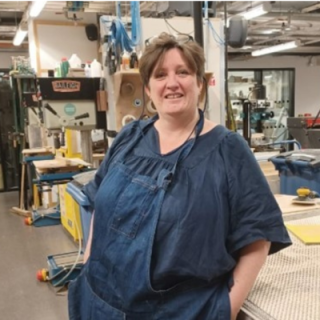General Workshop & Laboratory Services - Grade 8 (Management Pathway)
Example job roles: Technical Manager, Deputy Unit Manager, Facilities and Lab Operations Manager, Building Manager, Safety Officer
Level: Advanced
Experiences
Activities and responsibilities likely to be required when working at this level
Health & Safety responsibilities
- Advise and oversee significant equipment purchases ensuring compliance and alignment to School/Department/Faculty/Research Centre/Research Group priorities in conjunction with Senior Specialist Technicians where appropriate
- Ensure that all equipment is appropriately maintained in conjunction with Senior Specialist Technicians where appropriate
- To be responsible for the implementation of the University's health and safety policy, translating this into effective local policies and procedures
- Hold specific safety responsibilities (e.g. membership of School/Department/Faculty/Research Centre/Research committees)
- Work with Principal Investigators to ensure all necessary safety paperwork is completed/reviewed across the School/Department
- Lead safety inspections and accident investigations
- Maintain up-to-date health and safety knowledge providing expert support/advice to others
Core responsibilities
- Provide management, motivation and support to the School/Department/Faculty/Research Centre/Research technical team developing the team to keep pace with changing teaching, research and technology needs
- Schedule, prioritise and monitor work and performance in line with demands and deadlines
- Be responsible for the recruitment of all technical staff
- Manage all space and its allocation ensuring that it is used to maximum effect
- Work collaboratively with other areas of the University to achieve efficiency and elimination of duplicated effort
- Organise and facilitate meetings as necessary and attend and present at School/Department/Faculty/Research Centre/Research meetings and forums
- Lead the development of School/Department services and facilities ensuring that they remain fit-for-purpose and deliver maximum benefit
- Lead change-management initiatives at a local level in collaboration with more senior staff
- Hold responsibility for the effective operation of stock control, whole life costings and asset management/inventory systems across the School/Department/Faculty/Research Centre areas
- Contribute data to influence budget-setting processes
- Hold overall management responsibility for all facilities ensuring that local facility management arrangements are robust and compliant
- Lead small- and large-scale buildings works
- Oversee School/Department/Faculty/Research Centre/Research Group security and access control arrangements
- Assess, develop and implement School/Department/Faculty/Research Centre/Research-wide training/development arrangements
- Develop and maintain a broad knowledge and skills base, sharing with others
- Mentor/coach junior staff
- Ensure invoices and internal transfers are processed correctly
- Manage specific specialist laboratory or facility areas of work
Personal and professional development
- Development options to consider when working towards this level
Learning on the job
- Provide short term cover during periods of annual leave, for senior management
- Provide consultancy with internal and external stakeholders
- Develop and run training sessions for staff
- Deputise for day to day tasks as required for the line manager
- Take ownership of projects at a higher level
- Delegate pieces of work to junior members of staff
- Leading on small facility, equipment, leading on large scale design/developing engineering projects or policy projects
- Provide advice on the implementation of policy,
- Provide costs of equipment and/or infrastructure for research funding applications and other projects,
- Developing an understanding of how lab/workshops are managed
Learning from others
- Work shadow other team members in their area of responsibility
- Seek out secondment opportunities
- Seek out mentoring opportunities
- Attend and present at relevant conferences
- Participate in boards and international committees
Formal learning
- • Accreditation/certification from a recognised professional body
- • Specialised training related to the specific area
- • UCL Leadership and/or Management training
- • Apply for training through a mid-career apprenticeship programme
Transferable skills and competencies
- UCL uses the Universal Competency Framework (UCF) to discuss transferable skills. Find out more details on the framework.
- Following instructions and procedures
- Following directions
- Following procedures
- Time keeping and attending
- Demonstrating commitment
- Showing awareness of safety issues
- Complying with legal obligations
Working with people
- Understanding others
- Adapting to the team
- Building team spirit
- Recognising and rewarding contributions
- Listening
- Consulting others
- Communicating proactively
- Showing tolerance and consideration
- Showing empathy
- Supporting others
- Caring for others
- Developing and communicating self-knowledge and insight
Analysing
- Analysing and evaluating information
- Testing assumptions and investigating
- Producing solutions
- Making judgements
- Demonstrating systems thinking
UCL Ways of Working
- These describe expected behaviours in line with UCL culture and values. For Ways of Working indicators and steps to development please refer to the Ways of Working website.
4 January 2024
“Career Pathway roles are indicative and are not intended to be a description of the role in terms of responsibilty and duties.
Job family
Find out more about the General Workshop & Laboratory Services job family.
Other General Workshop & Laboratory Services profiles:
Print versions
Career Case Studies
Progression can lead to these type of General Workshop and Laboratory Services roles.

Niamh Grace
Workshop Manager, The Bartlett Manufacturing and Design Exchange (B-made)
 Close
Close

